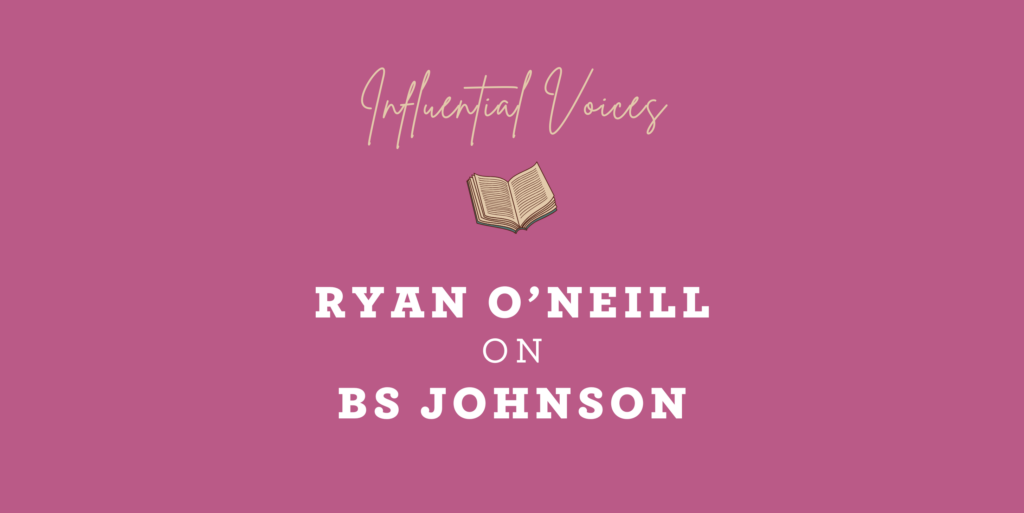
Let’s start with a test. I’ll give you a moment to get a pen (though if you are reading this, you’re probably a writer, and you really should have a pen with you at all times).
…………………..
Are you back? Good. The test is simple. Read each word below and write the first thing that comes to mind. The first is just a practise.
CAT ___________
Did you write dog? Good. Now, here is the real test. There are four words. Ready? Let’s begin.
POSTMODERN ___________
EXPERIMENTAL ___________
AVANT-GARDE ___________
METAFICTION ___________
Now, let’s look at your answers. If they were mostly words with negative connotations, I wouldn’t blame you. You might have written ‘dull’ or ‘pretentious’ or ‘show-off’ or even ‘dense’ and ‘unreadable’. That’s what I would have written if I had taken this test a few years ago. But that was before I came across the postmodern, experimental, avant-garde metafictional novels of my favourite writer, BS Johnson.
I began this piece by using one of Johnson’s favourite literary devices, the writer addressing the reader directly. In the six novels published during his lifetime, and one published after his suicide in 1973, Johnson demonstrated his belief that for an author and a reader to pretend a book was somehow ‘real’ was ridiculous. Johnson detested the literary conventions that most of us take for granted reading a novel: that characters act rationally, that the complexities of the world can be explained through fiction, that authors shouldn’t draw attention to themselves as this will destroy the reader’s suspension of disbelief. These comforting conventions of realism, for Johnson, bore little relationship to reality. Each of his novels utilises a radical departure from
Wait. I’m not convincing you, am I? That’s the thing with talking about Johnson. You end up using words like ‘conventions of realism’ and ‘suspension of disbelief’, words that send many readers running a mile. But reading Johnson is different; he is funny, inventive, hugely entertaining and clever. And by clever, I don’t mean clever-clever. (Well, only sometimes.) Let’s try something more engaging. A personal anecdote?
I first came across BS Johnson in a dismissive footnote in a textbook, which described how he had written a ‘book in a box’ with loose pages that could be read in any order. At that time, all Johnson’s books had been out of print for decades, but I eventually tracked down Albert Angelo (1964), mistakenly thinking it was the novel in the box. It wasn’t — that was The Unfortunates (1969) — but it did have holes in some of the pages, which impressed me even more. Albert Angelo is the story of Albert, a substitute teacher and frustrated architect living in London in the 1960s, mooning over a failed love affair. Each chapter is told in a different style, including one that gives, in two columns, Albert’s monologue as he teaches an uninterested English class, and his private thoughts, often amusingly inappropriate. In another section, the holes in the pages enable the reader to see into the future of the book. (Apparently the novel was seized by Australian censors because they thought someone had cut out the dirty bits.) Near the end, Johnson himself appears to tell the reader Fuck all this lying what I’m really trying to write about is writing not all this stuff about architecture … telling stories is telling lies. Albert Angelo is not about Albert, but Johnson. And aren’t all books really about the writer? Poor Albert is casually killed off a few pages later, just to give the novel an ending. Albert Angelo should be required reading for all those suspicious of ‘writing about writing’ as it
Wait. Three hundred words remaining? That’s not enough space to talk about Travelling People (1963), Christie Malry’s Own Double Entry (1973), Trawl (1966), The Unfortunates (1969), House Mother Normal (1971) and See the Old Lady Decently (1975) except to say that Johnson is one of the very few writers to have invented a new form for each of his novels. At a time when, as a reader and a writer, I was becoming sick of realism, with its well-crafted characters, its moments of epiphany (‘He stared out of the window as the rain fell, and knew nothing would ever be the same’) and its well-constructed, tidy worlds, Johnson inspired me to push my writing into different forms, such as graphs, charts and book reviews, and even occasionally to pop out from behind whatever I was writing and show myself, the author. (Hello, by the way. I’m Ryan. I don’t think we were formally introduced.) Perhaps most importantly, he freed me of a fallacy that I held for too many years: that truly great writing needed to be serious, and talk about serious things. Johnson is a great writer, and he is hilarious.
BS Johnson was once called ‘the ultimate forgotten author’ but thankfully several of his novels have recently come back into print. I hope this article has convinced you he deserves to be read, and remembered. In fact, let’s test that. Now, get your pen again. What word comes to mind after reading the word below?
BS JOHNSON ___________
Thank you.
About the Writer
Ryan O’Neill’s short stories have appeared in numerous journals and anthologies. His collection The Weight of a Human Heart is published by Black Inc. He lives in rural NSW with his wife and two daughters.
